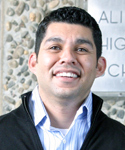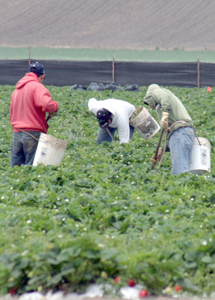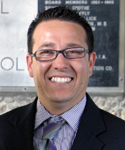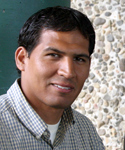 Salinas, Calif. - As the national debate over immigration continues, three Wabash College graduates with first-hand knowledge shake their heads at some of the suggestions but agree things must change.
Salinas, Calif. - As the national debate over immigration continues, three Wabash College graduates with first-hand knowledge shake their heads at some of the suggestions but agree things must change.
Ernie Vela ’95, Anthony Avitia ’96, and Hugo Mariscal ’98 acknowledge there is a problem. Mariscal picked strawberries in the Salinas Valley as a young man. The other two didn’t work regularly in the fields, but spent some time as teenagers doing the back-breaking work. (Editor's Note: Wabash Public Affairs writer Howard Hewitt is in California visiting nine alums, follow his trip in the Wabash West blog.)
"A concern that I have as a citizen of this country is with terrorism, crime, and illegal drugs - absolutely, let’s close the borders," Vela said. "But I wouldn’t say build a fence, and the reason I don’t say that is people are innovative. If you just count on building a fence there is going to be a way of defeating that."
The three men dismiss the idea of a fence and are unsure what to make of additional National Guard troops or security measures.
 "I don’t think building a wall is going to achieve anything other than a bunch of problems," Avitia agreed. "Change needs to be made at all levels. There has to be some sort of accountability. George Bush’s guest worker program might not be a bad idea. I don’t think people should be allowed to stay here as long as they want, but if you’re creating a worker program where they can come spend a couple years and work, pay taxes, and then return home that would be ideal."
"I don’t think building a wall is going to achieve anything other than a bunch of problems," Avitia agreed. "Change needs to be made at all levels. There has to be some sort of accountability. George Bush’s guest worker program might not be a bad idea. I don’t think people should be allowed to stay here as long as they want, but if you’re creating a worker program where they can come spend a couple years and work, pay taxes, and then return home that would be ideal."
 But the problems occur on both sides of the border, Vela pointed out.
But the problems occur on both sides of the border, Vela pointed out.
"The Mexican government needs to revamp and it needs to do more for our people," the elementary school principal said. "With crime and the way things are down there, politically and terms of government, it is an injustice to a lot of people. You have the rich-rich and the poor-poor. You don’t necessarily have a middle class. Those poor-poor who are dealt nothing want an outlet.
"There is a crazy belief of people in Mexico, and I’m not joking, they think there is money out in the streets. They think that it grows on trees here, that’s the perception. I don’t know if it’s the media or movies where they get that idea, but there is a perception in Mexico and Latin American countries that once you arrive in the United State you’re going to be wealthy or you’re going to make money. That is the drive why people want to come."
There are approximately 11 million illegal immigrants in the United States, 80 percent of those illegal immigrants are believed to be Latino.
The Wabash men feel some sort of amnesty program is the only logical answer. "For those families that have been here so long, for years, I would say yes, because many of those families have studied in our education system, families here are working, and they’ve grown up here. To say we’re going to send all back to Mexico or wherever they’re from - I don’t think that’s realistic.
"I think there can be something worked out if people can remain here if they’ve been here more than 7 years, I don’t have a plan, but something needs to be done to hold them accountable but allow them to stay."
 Vela points out that most of those millions have made a positive contribution to the country’s economy. "Here in California the fact that agriculture is our main industry, you’ll find that either legal or illegal immigrants are the workers of the fields. They are the ones that produce the crops, so to that degree I think we have to acknowledge the significant economic impact of these people. Just to deport them is going to deal a significant blow to the country’s economy."
Vela points out that most of those millions have made a positive contribution to the country’s economy. "Here in California the fact that agriculture is our main industry, you’ll find that either legal or illegal immigrants are the workers of the fields. They are the ones that produce the crops, so to that degree I think we have to acknowledge the significant economic impact of these people. Just to deport them is going to deal a significant blow to the country’s economy."
Avitia said there is another group at fault not getting enough attention in this debate." The companies that are hiring illegals are at fault, if not more than some of these other groups. Nobody is monitoring companies and they’re getting away with a lot. It needs to be done at all levels, there has to be some sort of accountability."
President Bush talked about immigrants learning English this week. The three Wabash graduates agree, but say it’s not that simple. Mariscal said language skills remain a big issue even at the high school level. The students have varying levels of English skills, but a number of the families still migrate back and forth to Mexico and must use both languages.
In the classroom you seldom hear anything but English. Around the Alisal High School campus during lunch, you hear mostly Spanish.
Vela has to communicate with parents who often speak little English. The students hear only Spanish at home and the transition has to be a gradual one or the students’ school work will suffer.
All three men emphasized immigrants should learn English, embrace the country’s history and culture but that it’s important they honor their own traditions and language as well.
 "We see this group of people as one of the foundation pillars to the economy here, at least in California," Vela said. "The time I went back to Midwest in October 2005 I could see the presence of immigrants in Crawfordsville, whether they were legal or not I don’t know, but there was more of diversity.
"We see this group of people as one of the foundation pillars to the economy here, at least in California," Vela said. "The time I went back to Midwest in October 2005 I could see the presence of immigrants in Crawfordsville, whether they were legal or not I don’t know, but there was more of diversity.
"The opportunities in this country are available for those who want to succeed, democracy is about that. I believe in that and I’m a product of that. It’s for those who have the hunger to go above and beyond and to get an education. Part of this Wabash visit to California is to acknowledge some of us who had challenges and overcome them and do something with our lives."
In photos: Top right: North of Salinas workers toil in the colorful lettuce fields. At left: Migrant workers picking strawberries. Mug shots, top to bottom: Avitia, Vela, Mariscal.